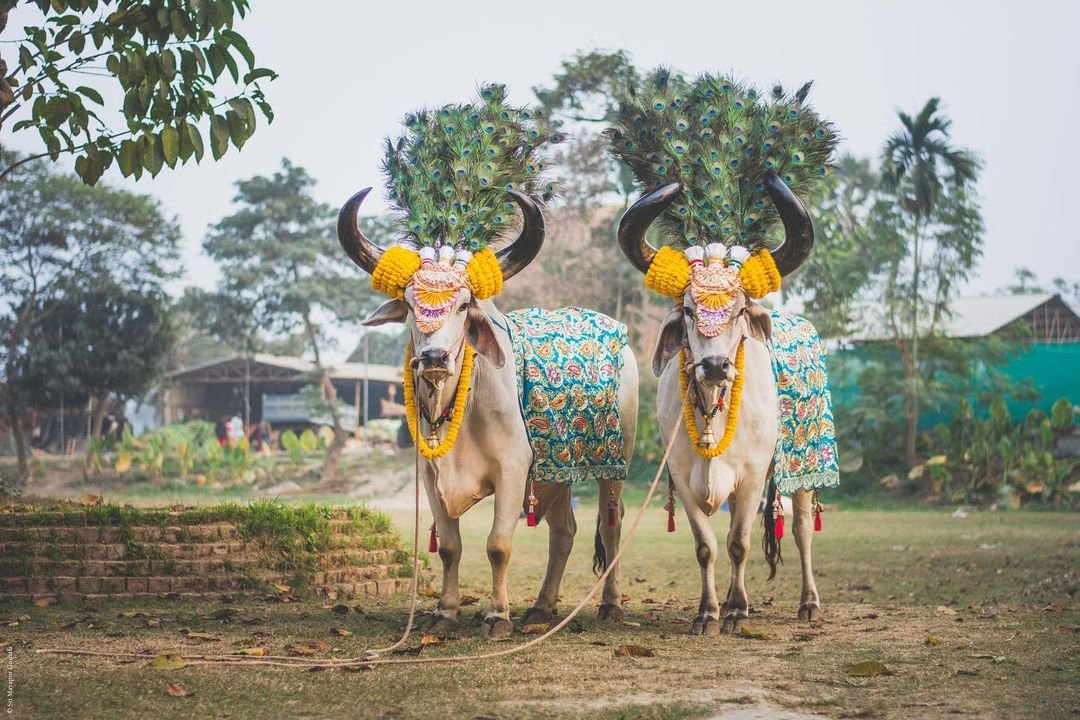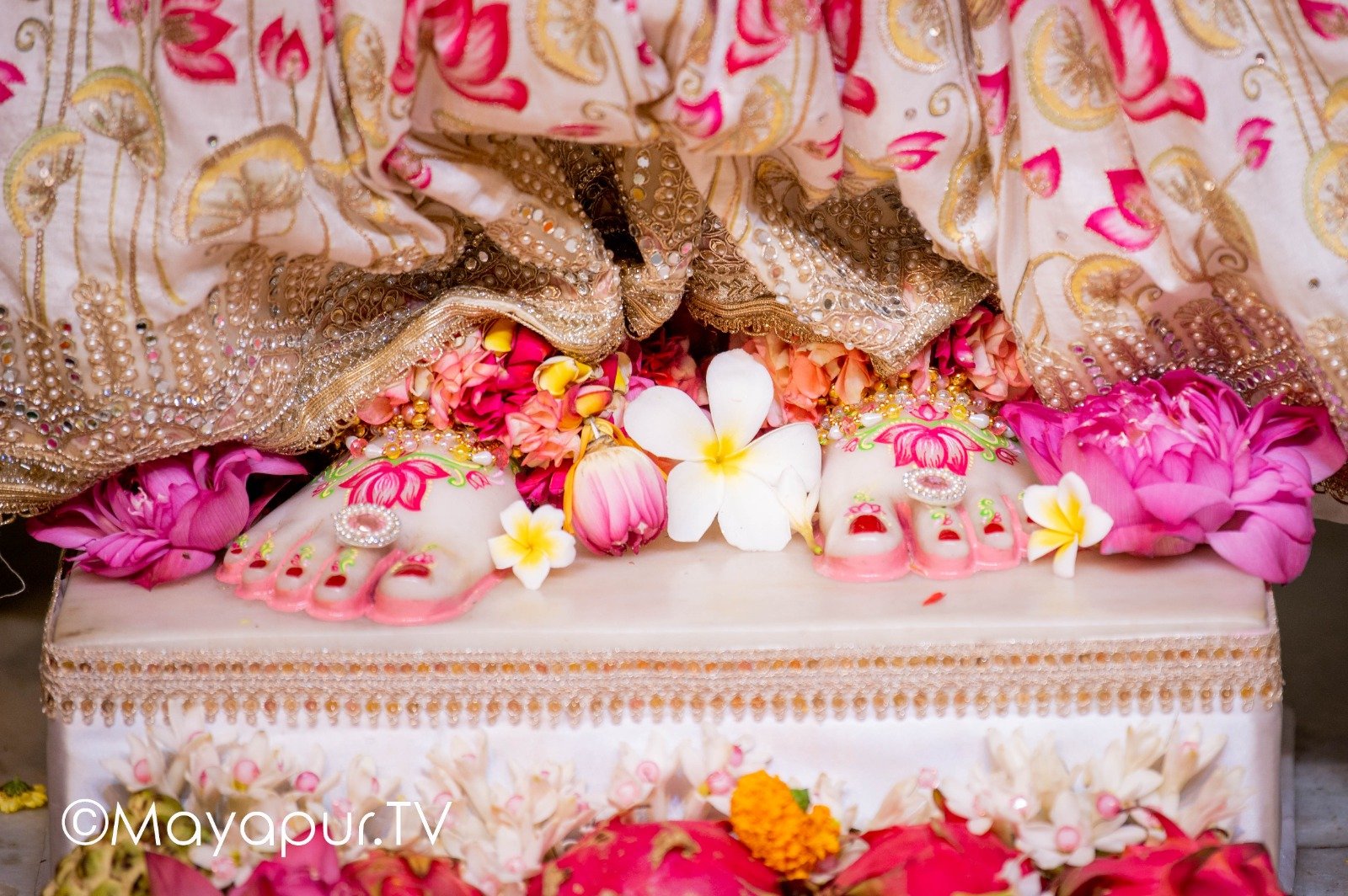

Gopastami
Śukadeva Gosvāmī said: When Lord Rāma and Lord Kṛṣṇa attained the age of paugaṇḍa [six to ten] while living in Vṛndāvana, the cowherd men allowed Them to take up the task of tending the cows. Engaging thus in the company of Their friends, the two boys rendered the land of Vṛndāvana most auspicious by imprinting upon it the marks of Their lotus feet.
PURPORT
Lord Kṛṣṇa wanted to encourage His cowherd boyfriends, who had been swallowed by Aghāsura and then stolen by Lord Brahmā. Therefore the Lord decided to bring them into the palm-tree forest called Tālavana, where there were many delicious ripe fruits. Since Lord Kṛṣṇa’s spiritual body had apparently grown slightly in age and strength, the senior men of Vṛndāvana, headed by Nanda Mahārāja, decided to promote Kṛṣṇa from the task of herding calves to the status of a regular cowherd boy. He would now take care of the full-grown cows, bulls and oxen. Out of great affection, Nanda Mahārāja had previously considered Kṛṣṇa too small and immature to take care of full-grown cows and bulls. It is stated in the Kārttika-māhātmya section of the Padma Purāṇa:
śuklāṣṭamī kārttike tusmṛtā gopāṣṭamī budhaiḥtad-dinād vāsudevo ‘bhūdgopaḥ pūrvaṁ tu vatsapaḥ
“The eighth lunar day of the bright fortnight of the month of Kārttika is known by authorities as Gopāṣṭamī. From that day, Lord Vāsudeva served as a cowherd, whereas previously He had tended the calves.“
The word padaiḥ indicates that Lord Kṛṣṇa blessed the earth by walking on her surface with His lotus feet. The Lord wore no shoes or other footgear but walked barefoot in the forest, giving great anxiety to the girls of Vṛndāvana, who feared that His soft lotus feet would be injured.
(SB 10.15.1 – Translation and purport composed by disciples of Śrīla Prabhupāda)
Kṛṣṇa said at that time that the cows are worshiped even by the demigods, and He practically demonstrated how to protect the cows. At least people who are in Kṛṣṇa consciousness should follow in His footsteps and give all protection to the cows. Cows are worshiped not only by the demigods. Kṛṣṇa Himself worshiped the cows on several occasions, especially on the days of Gopāṣṭamī and Govardhana-pūjā.
(NOD 21)
In this way Śrī Kṛṣṇa, along with His elder brother Balarāma, passed the childhood age known as kaumāra and stepped into the age of paugaṇḍa, from the sixth year up to the tenth. At that time, all the cowherd men conferred and agreed to give those boys who had passed their fifth year charge of the cows in the pasturing ground. Given charge of the cows, Kṛṣṇa and Balarāma traversed Vṛndāvana, purifying the land with Their lotus footprints.
Accompanied by the cowherd boys and Balarāma, Kṛṣṇa brought forward the cows and played on His flute as He entered the forest of Vṛndāvana, which was full of flowers, vegetables and pasturing grass. The Vṛndāvana forest was as sanctified as the clear mind of a devotee and was full of bees, flowers and fruits.
(KB 15)
So Nanda Mahārāja was rich because he possessed nine lakhs of cows, not… And Kṛṣṇa had to take care of. Although Kṛṣṇa was Nanda Mahārāja’s son, king’s son, still He had to go… When He was young, five, six years old, He had to take care, not only Kṛṣṇa, but all His friends. That was the system. Small boys, they would take care of the calves, and after sixth year, they would take care of the cows. So in this way, fifteen, sixteen years, they would pass.
(741001 – Lecture SB 01.08.21 – Mayapur)
As He grew to six and seven years old, the Lord was given charge of looking after the cows and bulls in the grazing grounds. He was the son of a well-to-do landholder who owned hundreds and thousands of cows, and according to Vedic economics, one is considered to be a rich man by the strength of his store of grains and cows. With only these two things, cows and grain, humanity can solve its eating problem. Human society needs only sufficient grain and sufficient cows to solve its economic problems.
(SB 3.2.29 purport)
namo brahmaṇya-devāya
go-brāhmaṇa-hitāya ca
jagad-dhitāya kṛṣṇāya
govindāya namo namaḥ
(Viṣṇu Purāṇa 1.19.65)
Lord Kṛṣṇa, the Supreme Personality of Godhead, is the prime protector of brahminical culture and the cow. Without knowing and respecting these, one cannot realize the science of God, and without this knowledge, any welfare activities or humanitarian propaganda cannot be successful.
(SB 4.21.38, Purport)
cintāmaṇi-prakara-sadmasu kalpa-vṛkṣa-
lakṣāvṛteṣu surabhīr abhipālayantam
lakṣmī-sahasra-śata-sambhrama-sevyamānaṁ
govindam ādi-puruṣaṁ tam ahaṁ bhajāmi
I worship Govinda, the primeval Lord, the first progenitor who is tending the cows, yielding all desire, in abodes built with spiritual gems, surrounded by millions of purpose trees, always served with great reverence and affection by hundreds of thousands of lakṣmīs or gopīs.
(CC Adi 5.22)
The cows, oh, as soon as they see Kṛṣṇa, they become . . . they lick up His feet and body, and every cow has got a different name. As soon as He will call, the cow will come immediately, and dropping milk. And those cows are also spiritual. Surabhī. It is described in the Brahma-saṁhitā, surabhīr abhipālayantam (Bs 5.29).
Surabhī. Surabhī cow means nonexhaustive. You can milk as much milk you want and as many times. In the material world the cow is limited. There is time that you can milk, morning and evening, and so much quantity, not more than that. But surabhīr means you can milk those cows anytime you like, and you can draw milk as many as you like, as much as you like. This is called surabhī. urabhīr . . . in the description of Brahma-saṁhitā: cintāmaṇi-prakara-sadmasu kalpa-vṛkṣa-lakṣāvṛteṣu surabhīr abhipālayantam. Surabhīr abhipālayantam. So therefore He is Govinda. He gives . . . He is pleasure for everyone.
(661211 - Lecture CC Madhya 20.152-154 - New York)
Especially if we are human being, the cow is supplying us milk, the most important foodstuff. So instead of giving protection to the cow, if we kill, do you think that is very sensible thing? No. I am supplying something very nice, and if you kill me, is that very good gratitude?
So at least in human life, these senses should be there. Cow protection is recommended in the Vedic literature because it is giving the most valuable foodstuff, milk. Apart from other sentiments, it is supplying, and in exchange of nothing. She simply eats some grasses from the ground. That's all. You don't have to provide cows with foodstuff. The things which you refuse, you take the grains and you supply the skin.
You take the fruit pulp, you supply the skin. You take the, I mean to say, from paddy. You take the rice. You supply the straw, and she delivers you a very nice foodstuff. And I have discussed all these point in my Śrīmad-Bhāgavatam, that human economic problem can be solved simply by having some land and some cows. That's all.
(680504 - Lecture SB 05.05.01-3 - Boston)
Govindam. And He is the protector, and pleasing to the cows.
You have seen many pictures of Kṛṣṇa, He is loving cow. Why cow is loved by Him? Why not another animal? There are many other animals. Why particularly cow? Because cow protection is the most important business of the human society.
In offering obeisances to Kṛṣṇa it is said, namo brahmaṇya-devāya go-brāhmaṇa-hitāya ca: "I offer my respectful obeisances unto the Supreme Person, who is the protector of the brahmins and the cows." Go-brāhmaṇa-hitāya ca jagad-dhitāya. The first qualification is that He protects the brahmins and the cows. Next, He protects the whole world. Jagad-dhitāya kṛṣṇa. And He is Kṛṣṇa, govindāya, this Govinda.
So the example is set by the Supreme Personality of Godhead that human civilization will advance only on the basis of brahminical culture and cow protection. As soon as there is falldown from brahminical culture, and as soon as there is discrepancy in the protection of cows, there will be no more peace in the world. Therefore He specifically said, go-brāhmaṇa-hitāya ca. This Kṛṣṇa consciousness movement is for the protection of brahminical culture and cows. Then automatically the peace of the world will come, if two things are done. This is Vedic literature.
(681204 - Lecture - Los Angeles)
Bull is the emblem of moral principle and the cow is the representative of the earth. When the bull and the cow are happy in joyful mood it is to be understood that the people of the world are also happy and are in joyful mood. The reason is that the bull helps production of grains in the agricultural field and the cow delivers milk the miracle of aggregate food values. The human society therefore maintains, these two important animals very carefully so that they can wander everywhere in cheerfulness.
(SB 1.16.18 purport)
The cow is the most important animal for developing the human body to perfection. The body can be maintained by any kind of foodstuff, but cow's milk is particularly essential for developing the finer tissues of the human brain so that one can understand the intricacies of transcendental knowledge. A civilized man is expected to live on foodstuffs comprising fruits, vegetables, grains, sugar and milk. The bull helps in the agricultural process of producing grain, etc., and thus in one sense the bull is the father of humankind, whereas the cow is the mother, for she supplies milk to human society. A civilized man is therefore expected to give all protection to the bulls and cows.
(SB 3.5.7 purport)
According to Vedic civilization, everyone has the responsibility for taking care of brāhmaṇas, old men, women, children and cows.
(SB 6.2.28 purport)
Cow protection is the business of the vaisyas and along with our preaching, this is the most important work. We must have a good section of Brahmanas in our society and we must also have a good group of vaisyas who can grow grains and tend cows, and thus supply the society with food-grains and milk products from the cow like ghee, curd, cream, etc.
(750526 – Letter to Hasyakari written from Honolulu)
According to smṛti regulation, the cow is the mother and the bull the father of the human being. The cow is the mother because just as one sucks the breast of one's mother, human society takes cow's milk. Similarly, the bull is the father of human society because the father earns for the children just as the bull tills the ground to produce food grains. Human society will kill its spirit of life by killing the father and the mother. It is mentioned herein that the beautiful cows and bulls were of various checkered colors—red, black, green, yellow, ash, etc. And because of their colors and healthy smiling features, the atmosphere was enlivening.
(SB 3.2.29 purport)
Putting on washed clothing, being always pure and being adorned with turmeric, sandalwood pulp and other auspicious items, before breakfast one should worship the cows, the brāhmaṇas, the goddess of fortune and the Supreme Personality of Godhead.
(SB 6.18.52)
O Kṛṣṇa, O friend of Arjuna, O chief amongst the descendants of Vṛṣṇi, You are the destroyer of those political parties which are disturbing elements on this earth. Your prowess never deteriorates. You are the proprietor of the transcendental abode, and You descend to relieve the distresses of the cows, the brāhmaṇas and the devotees. You possess all mystic powers, and You are the preceptor of the entire universe. You are the almighty God, and I offer You my respectful obeisances.
(SB 1.8.43)
The land became a person and collected all the drugs and herbs needed for installing the Deity. The cows delivered five products, namely milk, yogurt, ghee, urine and cow dung, and spring personified collected everything produced in spring, during the months of Caitra and Vaiśākha [April and May].
(SB 8.8.11)
